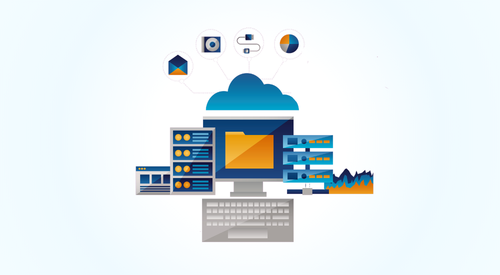

FinOps stands for Financial Operations, and it is a framework that empowers organizations to manage cloud costs more effectively by unifying the strengths of finance, technology, and business teams. It is the cultural movement toward financial accountability in cloud spending, allowing data-driven decisions to be executed in order to optimize cloud investments. Studies indicate that a significant majority (60%) of professionals feel their cloud expenses are overblown. FinOps brings cloud spending in line with business goals, thus aiding organizations in obtaining maximum value from their cloud platforms while keeping tight financial control.
Optimize for Zero Downtime with Niveus
What is FinOps?
The data from 2022 studies indicate a concerning trend of cloud overspending. Companies reported exceeding cloud budgets by 13% on average, and admitted to inefficient spending accounting for 32% of their total cloud costs. FinOps is a framework for managing cloud costs by bringing together finance, technology, and business teams. It involves a cultural shift towards financial accountability for cloud spending, enabling data-driven decisions and optimizing cloud investments.
Core principles of FinOps include:
- Collaboration: Supporting collaboration between finance, technology, and business teams.
- Continuous Optimization: The constant evaluation of cloud usage and expenses to spot cost-saving opportunities.
- Automation: Cost management automation can improve process efficiency.
- Data-Driven Decision Making: Being data-driven and analytics-based in cloud spending choices.
The role of FinOps in cloud financial management is to:
- Maximize business value from cloud investments
- Improve financial visibility and control
- Enable faster decision-making
- Reduce cloud costs
- Align cloud spending with business objectives
FinOps Framework
The most common FinOps framework consists of three key stages:
- Inform: Collecting and analyzing cloud cost data for the identification of spending patterns, the strong and poor parts, and the areas for optimization, respectively.
- Optimize: Taking measures to the level in which the costs of the provider are decreased, though maintaining standards of service.
- Govern: The management policies and compliance matters are the things to be established for controlling cloud spending.
Key metrics and KPIs used in FinOps include:
- Cost per unit of value: Measures the efficiency of cloud spending.
- Rightsizing recommendations: Identifies opportunities to optimize resource usage.
- Cost allocation: Distributes cloud costs across different business units or projects.
- Forecast accuracy: Measures the precision of cloud cost predictions.
- Return on cloud investment (ROCI): Quantifies the business value derived from cloud spending.
According to research, a mere 30% of respondents were able to allocate cloud expenses to particular products, departments, or customers.Organizations can monitor their FinOps progress and make the decision using data by concentrating on the aforementioned metrics.
Google Cloud FinOps in Singapore
Google Cloud provides a broad range of tools and capabilities for running a proper management and optimization of cloud spending. Singapore businesses can use the capabilities described above to proactively increase visibility into their cloud spending and bring transparency into areas of potential improvement, thus assuring maximum ROI on their cloud investments.
Google Cloud’s FinOps Tools and Features
Google Cloud gives a whole array of tools that can bring the FinOps practices into effect:
- Cost Management tools: This has the ability to show where cloud companies have money going, companies to health check their businesses regarding the of cloud services and provide recommendations on what services, departments, or employees should or could be cut.
- Recommendations: Is sophisticated to the extent of utilizing AI to offer the best outcomes for resource usage and cost reduction. The recommendations are formed by the system only the human is to put the depth and judgment into action.
- Reservations and Commitments: This service allows clients to make the financial commitments required, in advance, for continuous use that can subsequently, lead to reduced expenses on their part.
- Custom Alerts: Namely, giving the option of putting up notifications when cost exceeds a given limit or more money is being spent than planned, hence controlling the costs on a proactive basis.
Leveraging Google Cloud FinOps for Cost Optimization
To effectively leverage Google Cloud FinOps for cost optimization, organizations in Singapore can adopt the following best practices:
- Regularly monitor and analyze cloud costs: Utilize Google Cloud’s cost management tools to gain insights into spending patterns.
- Implement cost allocation: At the level of the business units, optimize the distribution of the cloud cost to different areas.
- Utilize rightsizing recommendations: Google Cloud’s rightsizing feature will give you the opportunity to increase the efficiency of the machines you use by configuring the resources you have.
- Leverage reservations and commitments: Another way to save on usage fees is to commit to a certain usage level for which Google Cloud offers discounts.
- Set up custom alerts: Notifications sent at the beginning of demand periods can help dispel potential overrun issues.
- Foster collaboration: Find a way of enabling integrated finance, technology, and other business units working together, to realize total discipline.
By following these guidelines, Singapore-based organizations can effectively manage their cloud costs and achieve optimal business outcomes.
Multi-cloud FinOps in Singapore
Managing cloud costs across multiple cloud platforms presents unique challenges that require specialized approaches. FinOps plays a crucial role in optimizing spending and ensuring financial accountability in multi-cloud environments.
Challenges of Multi-cloud Cost Management
With epic proliferation the challenges presented are:
- Complexity and fragmentation: The first and prime issue is the means of managing costs provided by the multiple vendors with the changing pricing schedule, APIs, and tools. This is quite overwhelming.
- Lack of visibility: Due to the diversity of the cost data from various cloud platforms a single view is not possible and this is challengingly difficult to find the chance for savings.
- Inconsistent pricing models: The competitors that have an alternate price model as IaaS (Infrastructure as a Service) can lead to comparing pricing and optimization in a complicated manner.
Strategies for Multi-cloud FinOps
Assuming the previous directions, implement the following actions to deal with the challenges of multi-cloud cost management:
- Centralized FinOps function: Form a special team of experts in cloud financial management exclusively working with all cloud hosts and services that will be capable of providing the budget across all areas and improve efficiency and consistency.
- Standardized metrics and reporting: An approach to employ identical metrics and reporting as well as templates that all cloud platforms will take up can be used for the outcomes of a cost comparison and analysis to be significant.
- Automation and orchestration: According to the calculations, automation systems for cost management and the usage of orchestration software will lead to the elimination of the manual part of the process that usually takes a lot of time.
Choose Niveus for FinOps as a Service
FinOps as a Service offers numerous advantages for organizations seeking to optimize their cloud spending and maximize the value of their cloud investments. By partnering with Niveus Solutions, businesses can leverage specialized expertise, tools, and processes to achieve their financial goals.
Cost Reduction and Optimization
- Cost-inefficiency deciphering: With Niveus, enterprises can bring to light the hidden costs of underutilized resources, inefficient spending as well as the waste of certain services.
- Right-sizing of resources: Determining the portrayal of resource usage, the measurements in FinOps enables firms to implement the appropriate resource allotment, hence avoiding over-provisioning.
- Forecasting and budgeting: Niveus helps cloud service providers to make accurate cost forecasts and budgets, supporting proactive financial planning processes.
Improved Visibility and Control
- Real-time cloud spending monitoring: Our FinOps strategy offers current information about cloud usage and costs, which leads to better-informed decision-making.
- Precise cost distribution: By accurately assigning cloud costs to different business units or projects, FinOps lessens costs and increases accountability.
- Chargeback models: These models bring a culture where extra costs are financed by other projects thus rendering it an effective method to curb the wasting of resources.
Faster Time to Market
- Faster cloud adoption: Niveus provides organizations with confidence in migrating to cloud platforms through detailed financial discipline and control.
- Resource utilization optimization: Besides cutting down on the wastage of resources, the most vital of Niveus’ goals is to cut short the total time of the project from the conceptualization to the deployment phase.
Risk Mitigation
- Spotting and treating finance risks: With our FinOps approach in place, it is possible to identify various ingrained financial risks that are often seen for cloud spending and then appropriately budget for those.
- Compliance: By keeping an eye on the expenses and the usage of the cloud, FinOps helps in taking care of the regulations related to the finances and the policies.
Conclusion
FinOps has emerged as a critical discipline for organizations operating in Singapore’s dynamic cloud computing landscape. By effectively managing cloud costs and optimizing resource utilization, FinOps empowers businesses to drive innovation, improve financial performance, and achieve sustainable growth.
The FinOps ecosystem in Singapore is a rapidly changing environment in which an increasing number of companies are providing different services as a way to meet the peculiarities and opportunities created by the multi-cloud environment. The significance of FinOps will only increase as cloud adoption continues to accelerate.
Organizations in Singapore that embrace FinOps can reap significant benefits, including cost reduction, improved visibility, faster time to market, and reduced financial risk. By partnering with a reputable FinOps service provider or building in-house capabilities, businesses can unlock the full potential of their cloud investments and gain a competitive advantage.
To thrive in today’s cloud-first economy, Singapore-based organizations must prioritize FinOps as a core business function. By adopting a data-driven approach to cloud cost management, businesses can optimize their spending, enhance their financial performance, and drive innovation.











